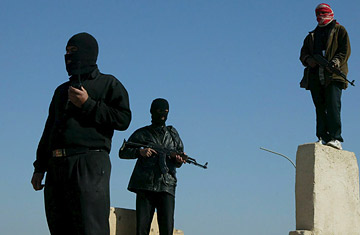
Members of the Mahdi Army stand guard during a parade in Najaf.
(2 of 2)
Once inside Iran, U.S. officials say, Iraqi volunteers hone skills needed to use armor-piercing roadside bombs, mortars and rockets against targets in Iraq. U.S. officials say, in addition, that Quds Force trainers, working at times apparently with experienced instructors from the Lebanese militia Hizballah, also instruct Iraqi recruits in intelligence techniques, sniper shooting and kidnapping operations before transporting them back across the border. Once in Iraq again, militants who have undergone Iranian training reportedly form cells that U.S. officials now refer to as "special groups." These cells, say U.S. officials, continue to receive funds, weapons and direction from the Quds Force as they mount attacks in Iraq against American troops.
Ali's own training in Iran came in late 2005, when he says he and a group of roughly 14 other Iraqis drove to the southern city of Amarah, near the Iranian border. Everything had been arranged through contacts in Syria and Lebanon, where he and his group had fled for a time trying to avoid capture by American forces. According to Ali, a convoy of new sport utility vehicles with drivers speaking only broken Arabic was waiting for them in Amarah. Soon the group was on the road east for a five-hour drive. The destination was an Iranian training facility, where instructors told the recruits not to speak to anyone but them. "We saw a lot of really strange people, a lot of men wearing very long beards," Ali says.
Ali and four others were given training in advanced explosives with both lectures and hands-on practice. The course was done in 45 days. At the end, a handler talked to each of them separately and gave them a phone number to call in Iraq. Ali was given $10,000 in cash, he said, with a handler telling him the money was meant to support his efforts.
"I was shocked," says Ali, who sat for an interview with TIME on the southern outskirts of Baghdad. "I never dreamed I would hold $10,000 in my hands." The starter money, however, was only a "drop in the sea." Ali says he continues to phone for funds with the contacts he made in Iran and that his group has conducted two successful roadside bomb attacks against American forces operating north of Baghdad.
Another Shi'ite guerrilla fighter interviewed by TIME offered a similar account, though he considered his group nationalist rather than sectarian. Says Abu Mohammed of his trainers in Iran: "They all speak perfect Arabic with a Lebanese accent. But we found out when we asked that they are either Quds Force or Iranian intelligence." Mohammed and his group, however, later lost interest in attacking coalition troops and eventually parted ways with their Iranian handlers.
Last fall, U.S. Ambassador to Iraq Ryan Crocker suggested that Iran may be lessening its militant activities in Iraq. He pointed to the cease-fire by Sadr, speculating that Iran may have had a hand in convincing the Shi'a warlord to take that approach. Crocker noted that rocket attacks against the Green Zone had dropped and wondered aloud whether Tehran was being suddenly more cooperative in Iraq.
Now, however, most of that talk has fallen away. Gen. David Petraeus recently made a point of saying publicly that Iran continues to train Iraqi militants. "These are individuals with considerable skill who can train other individuals in Iraq," said Petraeus, who spoke to reporters as he toured a border post in southern Iraq facing Iran. "It is a very unhelpful addition to the mix. We call it a lethal accelerant to a situation in Iraq that already has enough challenges."
TIME's staff in Iraq contributed to this article
